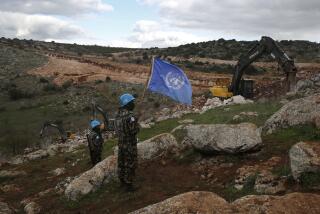U.N. Inspectors Hope for Low Profile in Iraq : Persian Gulf: But as tensions flare, team leader won’t rule out a confrontation with Baghdad during visit.
- Share via
MANAMA, Bahrain — As scores of U.S. warplanes continued to patrol the skies over southern Iraq on Monday, a 21-member U.N. nuclear-weapons inspection team arrived in Baghdad for a weeklong mission that its Italian leader said he hopes will be routine, “quiet and fruitful.”
But with the Kuwaiti government reporting a border incident with armed Iraqi civilians that left one Kuwaiti policeman dead and another seriously wounded, and U.N. officials describing a bomb incident Friday involving a vehicle used by U.N. guards in Iraq, team leader Maurizio Zifferero declined to rule out a confrontation with Iraq’s leadership during his team’s deliberately low-key visit.
Zifferero, who talked with reporters here in Bahrain before leaving for Baghdad and again upon arrival in the Iraqi capital, stressed that his team of 15 inspectors and six support personnel from the United States, France, Germany, Italy and Poland hopes that the intensive U.S.-led aerial enforcement of a “no-fly” zone banning Iraqi military flights over predominantly dissident Shiite enclaves in southern Iraq will not disrupt the team’s mission to ferret out missing pieces of Iraq’s ambitious nuclear-weapons program.
Asked whether his team’s mission--described by sources close to the U.N. effort to strip Iraq of its weapons of mass destruction as “largely paperwork”--could be used as a pretext by the West to escalate military action against Iraq, Zifferero said: “This is the opinion of some people, and we might happen to be the cause. But this is not our intention.
“Our policy is not to be the cause of provocation,” he said, clearly referring to the standoff over a previous team’s demand for access to Iraq’s Agriculture Ministry building in July. That confrontation triggered the latest round of tension between President Bush and Iraqi President Saddam Hussein.
Still, the chief weapons inspector stood firm that his team, if necessary, would not hesitate to inspect Iraq’s ministry buildings, which Hussein’s regime has declared off limits since the July standoff.
“If we have good reason to ask for an inspection in those areas,” he said, “we don’t beg.”
U.N. resolutions ending last year’s Persian Gulf War require Iraq to destroy its nuclear, chemical, biological and ballistic weapons programs before tough U.N. sanctions against Baghdad can be lifted.
“The sooner we are over, the sooner the sanctions will be lifted,” Zifferero told reporters. “It’s in everyone’s interest, and my expectation is a quiet, fruitful mission.”
From Baghdad itself, there was a change in tone Monday, just one day after Hussein angrily declared the U.S.-led plan to police the airspace over the southern part of his country “a conspiracy to dismember Iraq” that will permit the West to “partition the region into weak, tiny states and seize control over their oil wealth.”
Speaking to reporters during a formal session in Baghdad, Latif Nassif Jassem, Hussein’s former information minister and one of his key aides, said Iraq would place no obstacles in the way of the U.N. inspection team.
And though Jassem reiterated the Iraqi president’s vow to “confront” the allied no-fly zone, the Iraqi news agency INA quoted the army’s chief of staff, Iyad Rawi, as denying that Hussein’s regime is planning a ground offensive against Shiite Muslims in the area below the 32nd Parallel now protected by allied air patrols.
Rawi said such reports, cited by the allies as one reason for establishing the protected airspace, were groundless and part of “the American and Western lies and fabrications to justify aggression against Iraq.”
Although U.S. military sources in the Persian Gulf reported another quiet day in the skies over southern Iraq, where U.S. and British fighter jets have been flying as many as 100 sorties a day, there was a sketchy report from Kuwait of what appeared to be the first combat death on the ground since tensions in the Persian Gulf escalated.
Kuwait’s official news agency reported that a member of its border security force was shot and killed and another wounded in a confrontation Sunday with 21 armed Iraqis. According to the state news agency KUNA, the incident took place inside the nine-mile demilitarized zone created along the border between the two countries when the United States and its allies withdrew their forces after ending Iraq’s seven-month occupation of the tiny emirate in March, 1990.
An official of the Kuwaiti Interior Ministry confirmed the incident. The border zone also is patrolled by a special U.N. task force and the official said a Swedish observer also suffered minor injuries.
And in New York, a spokesman at U.N. headquarters reported that U.N. humanitarian workers in Iraq and their guards were placed on maximum alert Friday after a bomb was found attached to a car used by three of the guards.
Spokesman Francois Giuliani said a bomb was found affixed to the car in which three guards--part of a force that protects U.N. offices and humanitarian operations in Iraq set up after the Gulf War--were traveling into northern Iraq. The bomb did not go off.
More to Read
Sign up for Essential California
The most important California stories and recommendations in your inbox every morning.
You may occasionally receive promotional content from the Los Angeles Times.










